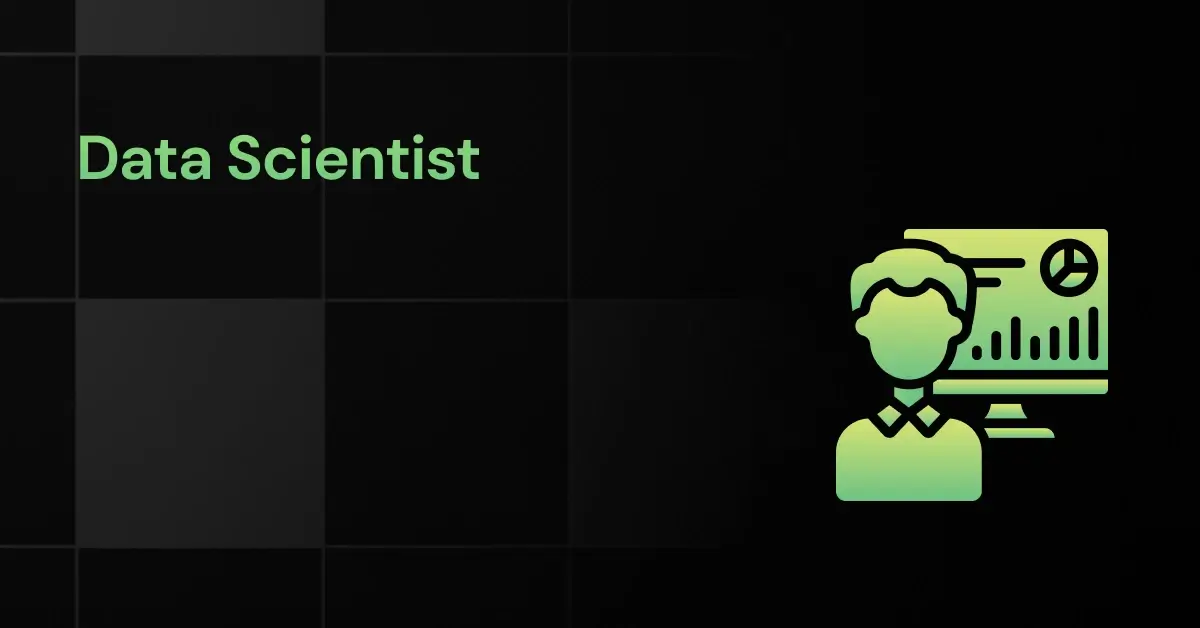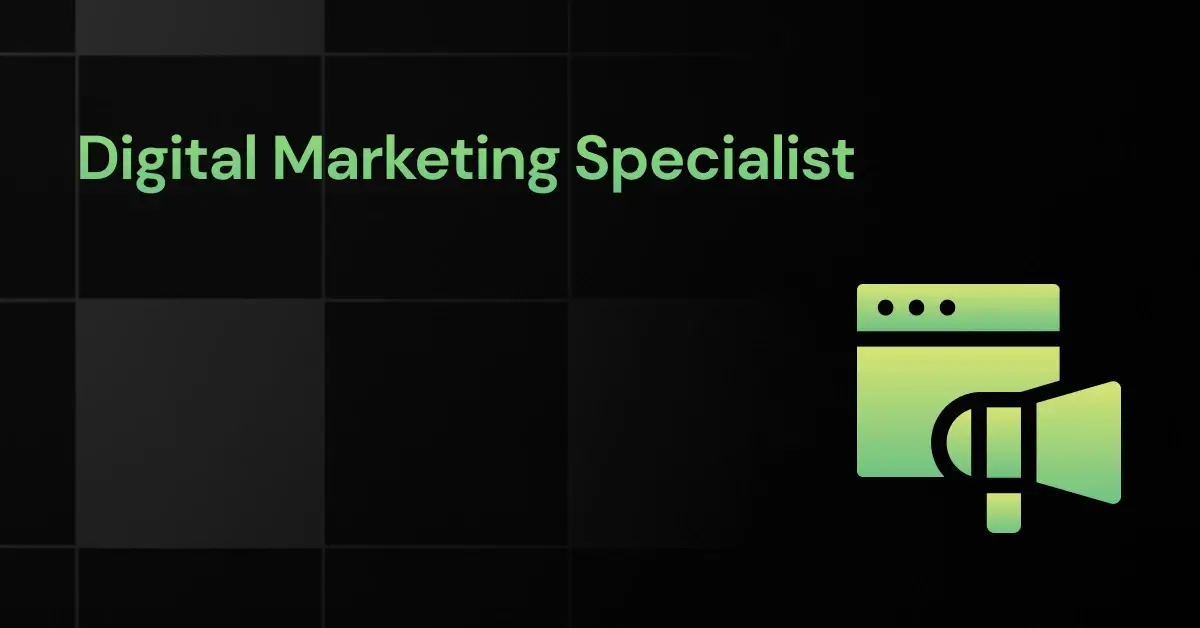Alternative Career Options for HR Professionals
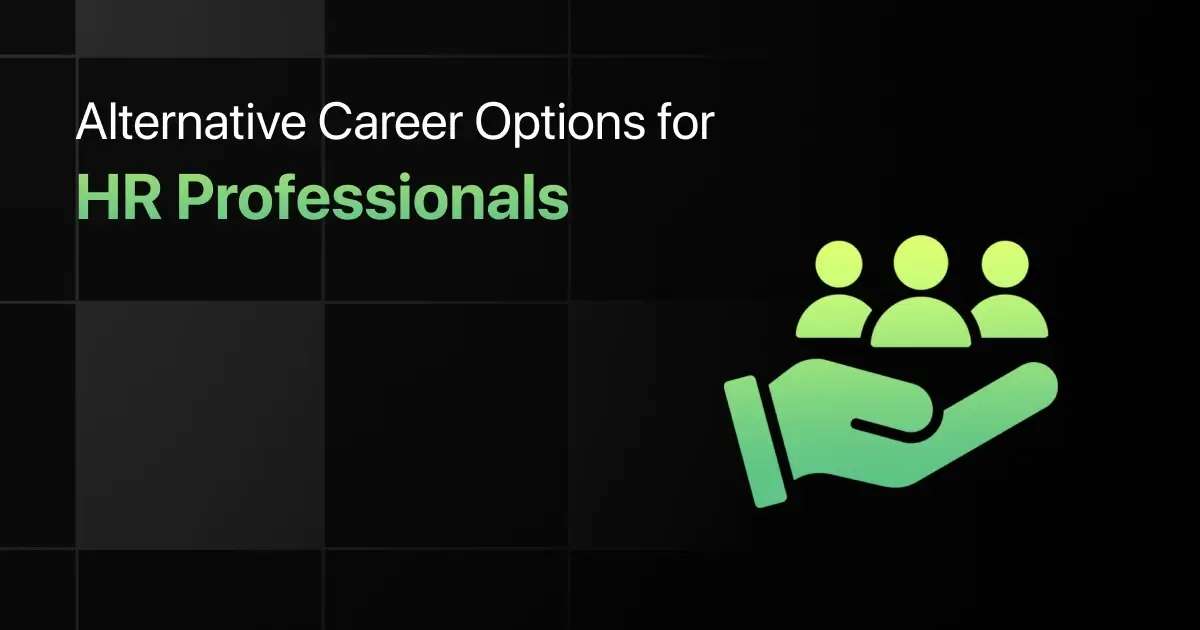
Are you in HR and thinking about a career change? You’re not alone. Many HR professionals are looking for something new because of tough work hours, wanting more freedom in their jobs, or just feeling too stressed.
The idea of exploring alternate career options for HR professionals might seem a bit daunting at first, but it’s an adventure worth considering!
In this blog, we’ll explore alternative career paths for HR professionals, offering insights into how their skills and experiences can open new doors.
Alternative Career Options for HR Professionals – Overview
Here’s an overview of alternative career options for HR Professionals with insights into transition time, starting salaries, and potential for remote work:
| S.No. | Career Options | Transition Time | Avg Starting Salary Per Annum (INR) | Potential for Remote Work |
|---|---|---|---|---|
| 1 | Data Scientist | 1-2 years | 6-10 Lakhs | Very High |
| 2 | Business Analyst | 6-12 months | 4.5-8 Lakhs | High |
| 3 | Digital Marketing Specialist | 6-12 months | 3.5-7 Lakhs | High |
| 4 | Benefits/Payroll Specialist | 6-12 months | 4-7 Lakhs | Moderate |
| 5 | Professional Resume Writer | 3-6 months | 3-6 Lakhs | High |
| 6 | Corporate Trainer | 1-2 years | 5-8 Lakhs | Moderate |
| 7 | Career Counselor or Coach | 1-2 years | 4-7 Lakhs | High |
| 8 | Scrum Master | 6-12 months | 6.5-10 Lakhs | Very High |
| 9 | Project Manager | 1-2 years | 7-12 Lakhs | High |
| 10 | Sales and Business Development | 6-12 months | 5-9 Lakhs | Moderate |
Career Change Options for HR Professionals – Let’s Explore the Alternatives
Below is the list of career change options or alternative employment for HR professionals:
1. Data Scientist
Data Science is a field focused on extracting insights and knowledge from data through various scientific methods, algorithms, and systems.
For HR professionals, transitioning to data science can be a rewarding move, as their skills in understanding human behavior and organizational needs can be valuable in interpreting data trends and patterns.
Job Market and Demand:
- The demand for data scientists in India is rapidly growing, with a significant increase in job openings over the past few years.
- Industries such as IT, healthcare, and finance are actively seeking data science professionals.
- The rise of big data and AI in India is creating more opportunities for data scientists.
Skills and Knowledge Prerequisites:
- Strong analytical and problem-solving skills.
- Proficiency in programming languages like Python or R.
- Knowledge of statistical methods and data analysis techniques.
- Familiarity with machine learning algorithms.
- Ability to interpret and communicate data insights effectively.
Transferable Skills from HR:
- Analytical thinking and problem-solving.
- Understanding of organizational behavior and dynamics.
- Strong communication skills for data storytelling.
- Experience in managing and interpreting complex data sets (e.g., employee data).
- Project management and strategic planning abilities.
Starting Salary:
- The average starting salary for a Data Scientist in India is approximately between INR 6,00,000 and INR 10,00,000 per annum.
Duration for Transition:
- Typically, 1-2 years, depending on prior experience and the intensity of learning and skill development.
Risk Assessment:
- Transitioning to data science involves a learning curve, especially in technical skills and programming.
Work Flexibility:
- Data science roles offer options for remote work, full-time, part-time, and freelancing opportunities.
- Many companies offer flexible working hours for data science roles.
Work-Life Balance:
- Generally favorable, but can vary depending on the company and specific role.
Career Progression:
- Opportunities to advance to senior data scientist, data analytics manager, or chief data officer.
- Potential to specialize in different domains like AI, machine learning, or big data.
Job Stability and Industry Outlook:
- High job stability due to the growing reliance on data across industries.
- Positive industry outlook with an increasing emphasis on data-driven decision-making in India.
2. Business Analyst
Business Analysts analyze data to make informed business decisions.
For HR professionals, this field offers a natural transition, leveraging their skills in data interpretation and understanding organizational needs to drive strategic decisions.
Job Market and Demand:
- The demand for business analysts in India is on the rise, with companies across various sectors seeking data-driven insights for business growth.
- The IT and e-commerce sectors, in particular, are showing a high demand for business analytics professionals.
- The increasing focus on data-driven strategies in Indian businesses is fueling this demand.
Skills and Knowledge Prerequisites:
- Strong analytical skills and a knack for interpreting complex data.
- Proficiency in data analysis tools and software.
- Understanding of business processes and strategies.
- Ability to communicate complex data insights in a simple manner.
- Knowledge of statistical methods and predictive modeling.
Transferable Skills from HR:
- Analytical thinking and problem-solving skills.
- Experience in handling and interpreting employee data.
- Strong communication skills for presenting data insights.
- Understanding of organizational behavior and dynamics.
- Strategic planning and decision-making abilities.
Starting Salary:
- The average starting salary for a Business Analyst in India is approximately between INR 4,50,000 and INR 8,00,000 per annum.
Duration for Transition:
- Transitioning to business analytics can take about 6-12 months, depending on the individual’s learning pace and background.
Risk Assessment:
- The shift to business analytics may require significant upskilling, particularly in technical and data analysis areas.
Work Flexibility:
- Business analytics roles often offer flexible working options, including remote work, full-time, part-time, and freelancing opportunities.
Work-Life Balance:
- Generally favorable, but can vary based on the industry and specific role requirements.
Career Progression:
- Potential to advance to senior analyst, analytics manager, or director of analytics roles.
- Opportunities to specialize in specific areas like market analytics, financial analytics, or operations analytics.
Job Stability and Industry Outlook:
- A stable career path with a growing demand for data-driven decision-making in businesses.
- Positive industry outlook with an increasing number of companies in India investing in analytics to drive business growth.
3. Digital Marketing Specialist
Digital Marketing is the practice of promoting products or services using digital channels to reach consumers.
This field is a great fit for HR professionals as it requires an understanding of people’s behaviors and preferences, skills that HR professionals typically possess.
Job Market and Demand:
- There’s a growing demand for digital marketing professionals in India, with a surge in digital consumption and online businesses.
- E-commerce, tech, and media industries are particularly seeking digital marketing experts.
- The shift towards digital platforms due to the pandemic has further accelerated this demand.
Skills and Knowledge Prerequisites:
- Proficiency in digital marketing tools and platforms.
- Understanding of SEO, content marketing, and social media strategies.
- Skills in data analysis and interpretation.
- Knowledge of marketing trends and consumer behavior.
- Creative thinking and campaign planning abilities.
Transferable Skills from HR:
- Strong communication and interpersonal skills.
- Ability to understand and predict consumer behavior.
- Experience in managing diverse teams and projects.
- Skills in data analysis and reporting.
- Strategic planning and organizational skills.
Starting Salary:
- The average starting salary for a Digital Marketing Specialist in India is approximately between INR 3,50,000 and INR 7,00,000 per annum.
Duration for Transition:
- Transitioning to digital marketing can take about 6-12 months, depending on the individual’s dedication to learning new skills and understanding the digital landscape.
Risk Assessment:
- The field is highly dynamic, requiring continuous learning and adaptation to new technologies and trends.
Work Flexibility:
- Digital marketing offers various work options, including remote work, in-office roles, and freelance opportunities, catering to different work-life balance needs.
Work-Life Balance:
- Generally favorable, but can vary based on campaign deadlines and project requirements.
Career Progression:
- Opportunities to advance to roles like Digital Marketing Director, Head of Digital, or Chief Marketing Officer.
- Potential to specialize in areas like SEO, social media, or content marketing.
Job Stability and Industry Outlook:
- Stable career path with a high demand for digital marketing skills in the current market.
- Positive industry outlook with digital marketing becoming a crucial part of business strategies in India.
4. Benefits/Payroll Specialist
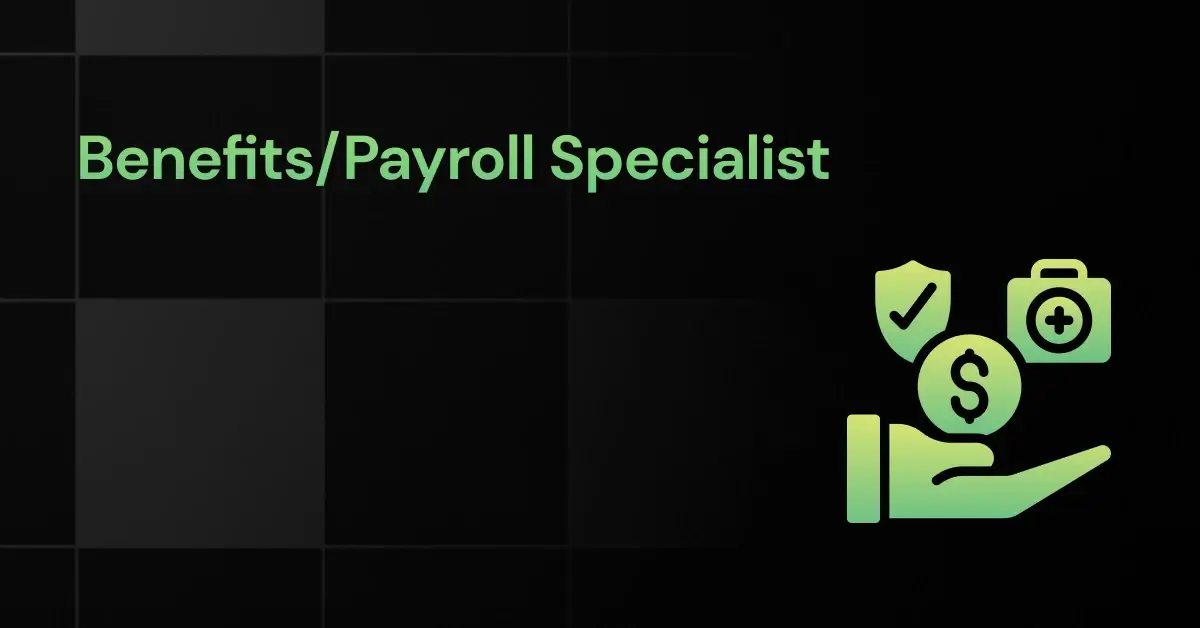


A Benefits/Payroll Specialist is responsible for managing employee compensation, benefits, and payroll processing.
This role is a great fit for HR professionals as it leverages their understanding of employee benefits, compensation structures, and regulatory compliance.
Job Market and Demand in India:
- The growth of the corporate sector and the complexities of managing employee compensation suggest a steady demand for these professionals.
- The increasing focus on employee satisfaction and retention in Indian companies highlights the importance of efficient benefits and payroll management.
- The evolving regulatory landscape regarding employee compensation and benefits in India necessitates specialized knowledge in this area.
Skills and Knowledge Prerequisites:
- In-depth knowledge of payroll processing and benefits administration.
- Familiarity with tax laws and compliance regulations related to employee compensation.
- Proficiency in payroll software and HRIS systems.
- Strong analytical and problem-solving skills.
- Attention to detail and accuracy in handling financial data.
Transferable Skills from HR:
- Understanding of employee compensation structures and benefits.
- Experience in handling confidential employee data.
- Strong organizational and time-management skills.
- Ability to communicate effectively with employees and management.
- Knowledge of HR policies and legal compliance.
Starting Salary in India:
- The average starting salary for a Benefits/Payroll Specialist in India is approximately between INR 4,00,000 and INR 7,00,000 per annum.
Duration for Transition:
- Transition duration can vary, typically ranging from 6-12 months, depending on the individual’s background in payroll and benefits administration.
Risk Assessment:
- Moderate risk, mainly due to the need for specialized knowledge and keeping up with regulatory changes.
Work Flexibility:
- Offers moderate flexibility, with roles available in various types of organizations.
Work-Life Balance:
- Generally balanced, but may require additional hours during payroll processing periods.
Career Progression:
- Opportunities to advance to senior roles in compensation and benefits management.
- Potential to specialize in areas like global compensation or benefits strategy.
Job Stability and Industry Outlook in India:
- Steady demand in various sectors due to the essential nature of the role.
- The increasing complexity of compensation and benefits management supports long-term relevance.
- The need for compliance with changing regulations ensures ongoing demand for skilled professionals in this field.
5. Professional Resume Writer
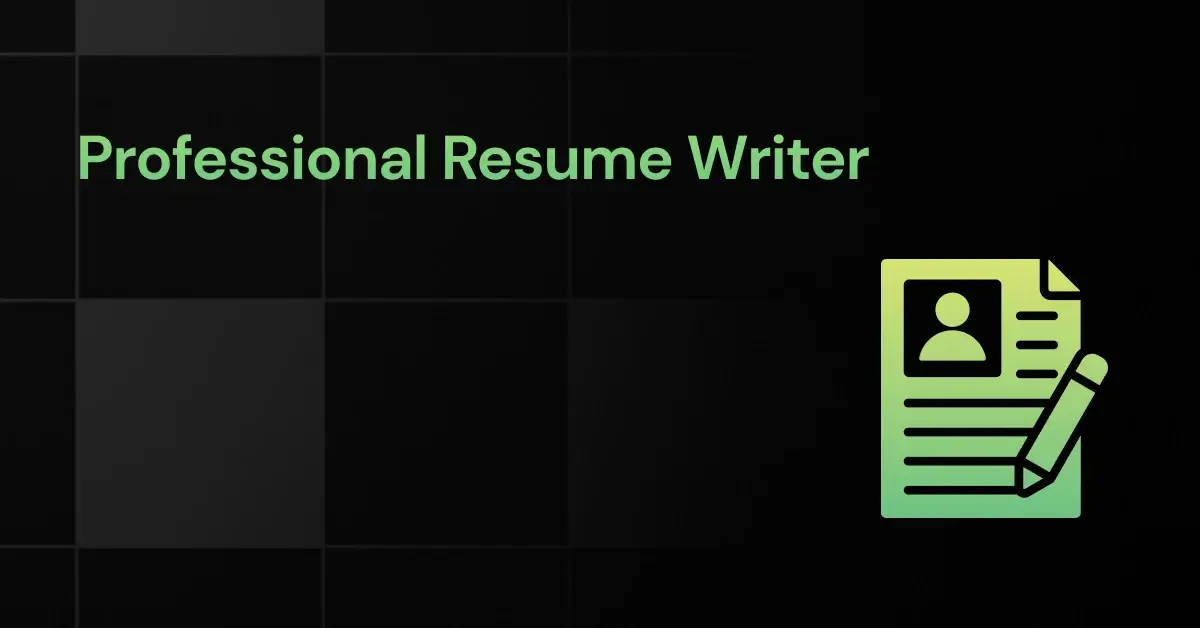


A professional resume writer specializes in crafting compelling resumes that highlight an individual’s skills and experiences.
This role is well-suited for HR professionals due to their in-depth understanding of recruitment processes and what employers seek in candidates.
Job Market and Demand in India:
- The growing job market and the increasing competitiveness in job applications suggest a rising need for professional resume writing services.
- The rise in online job portals and professional networking sites has amplified the need for well-crafted resumes.
- The increasing number of professionals seeking career transitions or advancements in India likely boosts the demand for resume writing services.
Skills and Knowledge Prerequisites:
- Expertise in resume formats and industry-specific requirements.
- Strong command of language and editing skills.
- Understanding of recruitment processes and applicant tracking systems.
- Ability to articulate and highlight an individual’s skills and achievements.
- Knowledge of current job market trends and employer expectations.
Transferable Skills from HR:
- Insight into recruitment criteria and what employers look for in resumes.
- Strong written communication and editing skills.
- Understanding of diverse job roles and industry requirements.
- Ability to assess and articulate individual strengths and experiences.
- Experience in guiding employees on career development.
Starting Salary in India:
- The average starting salary for a Professional Resume Writer in India is approximately between INR 3,00,000 and INR 6,00,000 per annum.
Duration for Transition:
- Transition can be relatively quick, often ranging from 3-6 months, depending on the individual’s proficiency in writing and understanding of the job market.
Risk Assessment:
- Low to moderate risk, primarily dependent on market demand and the writer’s ability to establish a client base.
Work Flexibility:
- High flexibility, with opportunities for freelance, part-time, or full-time engagements.
Work-Life Balance:
- Generally favorable, with the ability to work remotely and manage workload independently.
Career Progression:
- Potential to evolve into a career coach or consultant.
- Opportunities to specialize in specific industries or executive-level resume writing.
Job Stability and Industry Outlook in India:
- As the job market continues to evolve, the demand for professional resume writers is expected to remain steady.
- The increasing emphasis on personal branding and professional presentation may further enhance the market for resume writing services.
6. Corporate Trainer
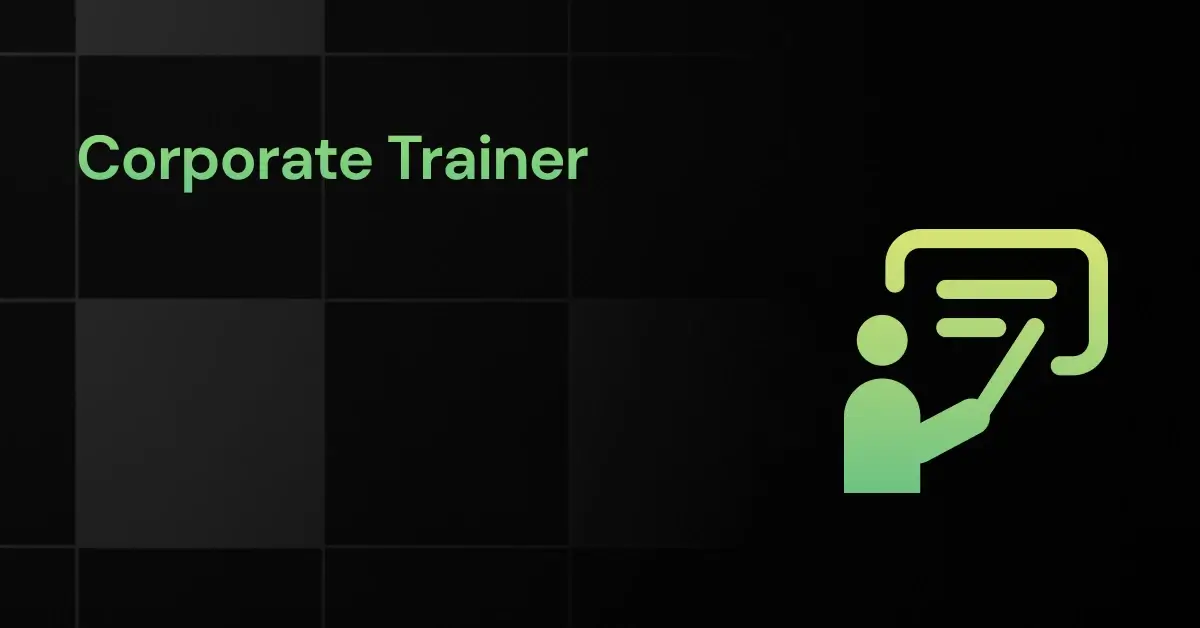


A Corporate Trainer is responsible for developing and delivering training programs to improve employee skills and knowledge. This role is particularly suitable for HR professionals, as it utilizes their expertise in employee development and organizational learning.
Job Market and Demand in India:
- The growing emphasis on employee skill development and continuous learning in the corporate sector suggests a significant demand for these professionals.
- The rise of digital learning platforms and e-learning solutions in India indicates a growing market for corporate training.
Skills and Knowledge Prerequisites:
- Expertise in designing and implementing training programs.
- Strong presentation and facilitation skills.
- Knowledge of adult learning principles and instructional design.
- Familiarity with e-learning platforms and digital training tools.
- Ability to assess training needs and measure training effectiveness.
Transferable Skills from HR:
- Understanding of organizational learning needs and employee development.
- Experience in designing and conducting training sessions.
- Strong communication and interpersonal skills.
- Ability to motivate and engage learners.
- Knowledge of HR policies and workforce management.
Starting Salary in India:
- The average starting salary for a Corporate Trainer in India is approximately between INR 5,00,000 and INR 8,00,000 per annum.
Duration for Transition:
- Transition duration can vary, typically ranging from 1-2 years, depending on the individual’s experience in training and development.
Risk Assessment:
- Moderate risk, influenced by the evolving needs of the corporate training market and the ability to adapt to new training methodologies.
Work Flexibility:
- Offers moderate flexibility, with opportunities in various industries and potential for remote training sessions.
Work-Life Balance:
- Generally balanced, but may require additional hours for training preparation and delivery.
Career Progression:
- Opportunities to advance to senior training and development roles.
- Potential to specialize in areas like leadership development or technical training.
Job Stability and Industry Outlook in India:
- Steady demand in the corporate sector, particularly in rapidly evolving industries.
- The shift towards continuous learning and development in organizations supports long-term relevance.
7. Career Counselor or Coach



A career counselor or coach specializes in guiding individuals through career transitions, offering personalized advice and support.
This profession aligns well with HR professionals’ expertise in understanding employee needs and career development, making it a natural alternative career path.
Job Market and Demand in India:
- The Indian education market is expected to reach US$ 225 billion by FY25, indicating a growing demand for educational services, including career counseling.
- India has the largest population in the world in the age bracket of 5-24 years, with 580 million people, presenting a significant opportunity in the education sector.
- Over 250 million school-going students in India, more than any other country, highlight the potential demand for career guidance services.
Skills and Knowledge Prerequisites:
- Proficiency in career development theories and coaching techniques.
- Strong understanding of various industries and job market trends.
- Excellent communication and interpersonal skills.
- Ability to conduct and interpret career assessments.
- Knowledge of educational pathways and professional qualifications.
Transferable Skills from HR:
- Expertise in people management and development.
- Strong communication and interpersonal abilities.
- Proficiency in conflict resolution and negotiation.
- Insight into organizational dynamics and employee behavior.
- Experience in training and development programs.
Starting Salary in India:
- The average starting salary for a Career Counselor or Coach in India is approximately between INR 4,00,000 and INR 7,00,000 per annum.
Duration for Transition:
- Typically 1-2 years, depending on prior experience and qualifications.
Risk Assessment:
- Moderate risk due to the need for specific qualifications and market conditions.
Work Flexibility:
- High flexibility with options for part-time, full-time, and freelance work.
Work-Life Balance:
- Generally favorable, with manageable work hours and low physical strain.
Career Progression:
- Opportunities to advance to senior coaching roles or start a private practice.
- Potential to specialize in niche areas like executive coaching or educational counseling.
Job Stability and Industry Outlook in India:
- Steady growth in demand, particularly in urban areas.
- Increasing recognition of the importance of career guidance.
- Resilience to economic fluctuations due to diverse client bases.
8. Scrum Master
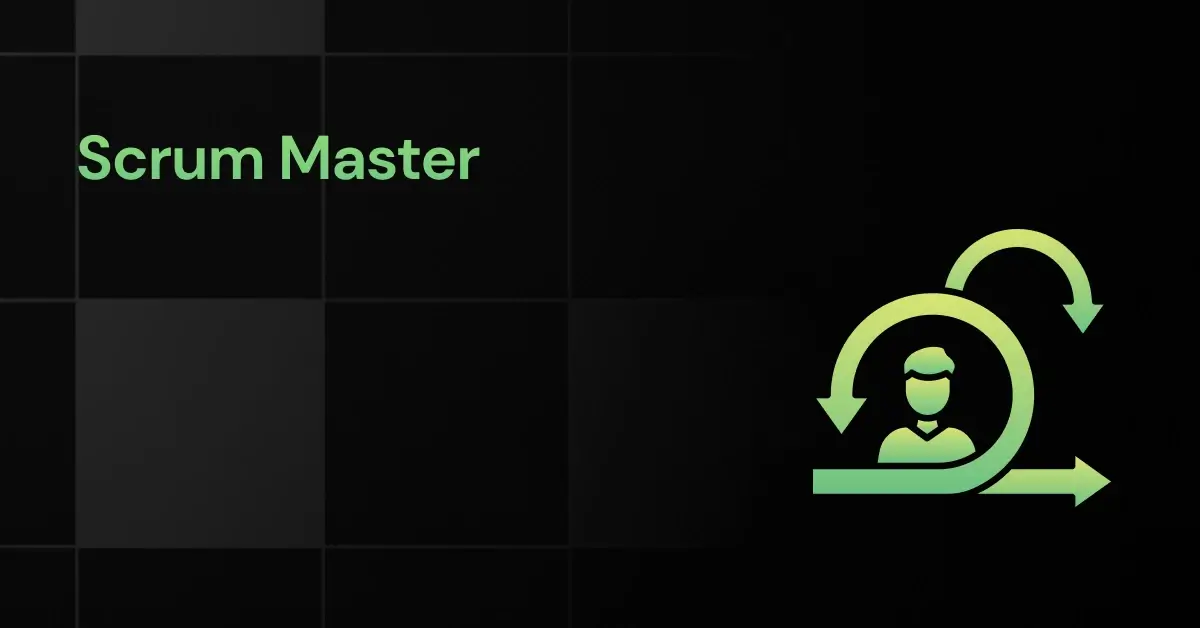


A Scrum Master is a key facilitator within an Agile development team, primarily responsible for ensuring the team adheres to Agile practices and principles.
This role is a good fit for HR professionals as it requires strong interpersonal skills, an ability to manage team dynamics, and a focus on nurturing a productive and positive work environment.
Job Market and Demand:
- The demand for Scrum Masters in India is growing, particularly in the IT and software development sectors.
- With the increasing adoption of Agile methodologies, companies are actively seeking skilled Scrum Masters.
- The role is becoming essential in organizations that are transitioning to Agile frameworks.
Skills and Knowledge Prerequisites:
- Deep understanding of Agile methodologies and Scrum practices.
- Strong facilitation and team leadership skills.
- Ability to coach and mentor teams in Agile practices.
- Conflict resolution and problem-solving skills.
- Knowledge of project management tools and techniques.
Transferable Skills from HR:
- Excellent communication and interpersonal skills.
- Experience in conflict resolution and team management.
- Strong organizational and planning abilities.
- Ability to coach and mentor individuals and teams.
- Skills in fostering a collaborative and inclusive work environment.
Starting Salary:
- The average starting salary for a Scrum Master in India is approximately between INR 6,50,000 and INR 10,00,000 per annum.
Duration for Transition:
- Transitioning to a Scrum Master role can take about 6-12 months, depending on the individual’s ability to acquire Agile-related skills and certifications.
Risk Assessment:
- The role requires continuous learning and adaptation to evolving Agile practices and team dynamics.
Work Flexibility:
- Scrum Master roles often offer flexible working options, including remote work and part-time opportunities, depending on the organization.
Work-Life Balance:
- Generally balanced, but can involve periods of high intensity during project sprints.
Career Progression:
- Potential to advance to senior Scrum Master, Agile Coach, or Product Owner roles.
- Opportunities to specialize in different Agile methodologies or industry sectors.
Job Stability and Industry Outlook:
- Stable career path with a growing demand for Agile and Scrum expertise in the tech industry.
- Positive industry outlook as more companies adopt Agile frameworks for project management.
9. Project Manager
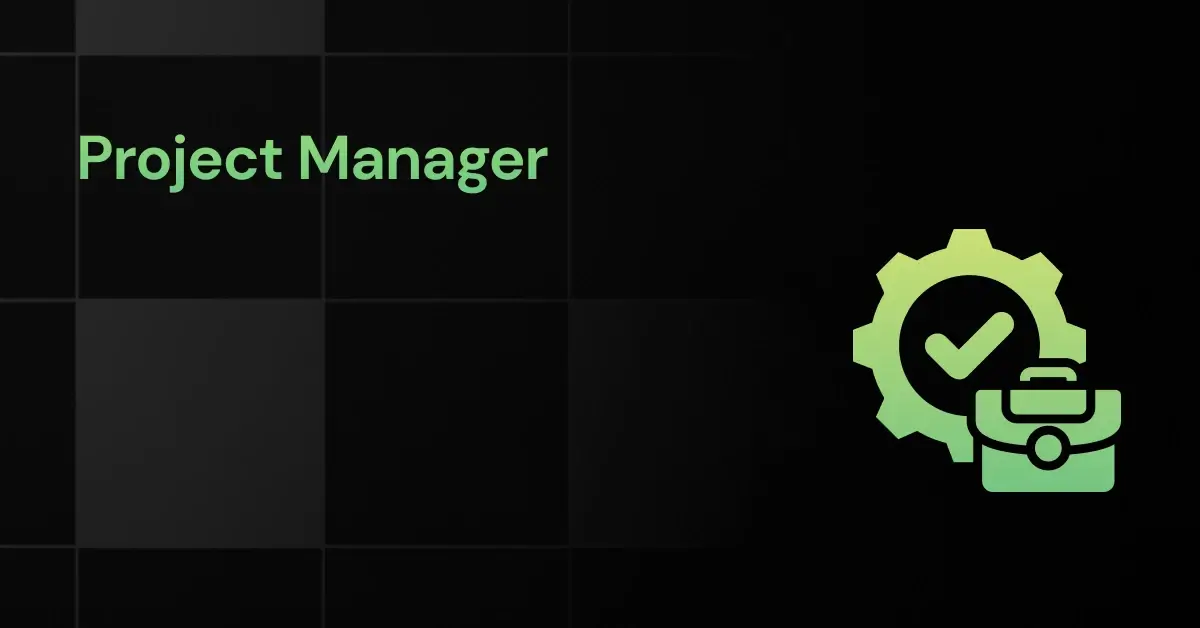


A Project Manager is responsible for planning, executing, and closing projects, ensuring they are completed on time, within budget, and to the specified quality.
This role is well-suited for HR professionals due to their skills in organization, communication, and team management, which are crucial for successful project delivery.
Job Market and Demand:
- The demand for Project Managers in India is robust, particularly in sectors like IT, construction, and manufacturing.
- With the growth of various industries, the need for skilled Project Managers is on the rise.
- The role is increasingly recognized as critical for the successful implementation of projects across different domains.
Skills and Knowledge Prerequisites:
- Strong leadership and management skills.
- Proficiency in project management tools and methodologies.
- Excellent communication and negotiation skills.
- Ability to manage budgets, timelines, and project scopes.
- Risk management and problem-solving abilities.
Transferable Skills from HR:
- Effective communication and interpersonal skills.
- Experience in team leadership and conflict resolution.
- Organizational and planning capabilities.
- Skills in negotiation and stakeholder management.
- Ability to work under pressure and adapt to changing environments.
Starting Salary:
- The average starting salary for a Project Manager in India is approximately between INR 7,00,000 and INR 12,00,000 per annum.
Duration for Transition:
- Transitioning to a Project Manager role can vary, typically ranging from 1-2 years, depending on prior experience and the acquisition of relevant skills and certifications.
Risk Assessment:
- The role involves managing multiple aspects of a project, which can be challenging and requires effective risk management skills.
Work Flexibility:
- Project Manager roles may offer flexible working options, including remote work, depending on the organization and the nature of the projects.
Work-Life Balance:
- The role can be demanding, with tight deadlines and high responsibilities, which may impact work-life balance.
Career Progression:
- Opportunities for advancement to senior project manager or program manager roles.
- Potential to specialize in specific industries or types of projects.
Job Stability and Industry Outlook:
- Stable career path with a consistent demand for skilled Project Managers.
- Positive outlook with the expansion of industries and increasing complexity of projects.
10. Sales and Business Development
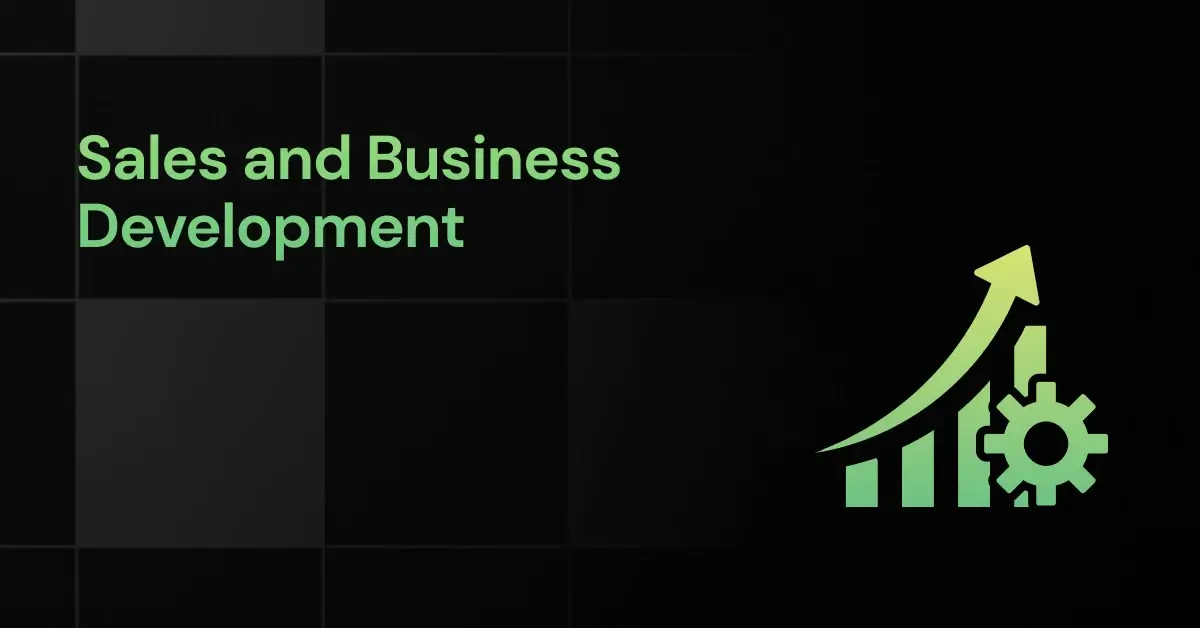


Sales and Business Development roles involve identifying and developing new business opportunities, building and maintaining relationships with clients, and negotiating and closing deals.
This career path aligns well with HR professionals due to their strong interpersonal skills, understanding of organizational dynamics, and ability to build and nurture relationships.
Job Market and Demand:
- There is a consistent demand for sales and business development professionals in India, especially in sectors like IT, pharmaceuticals, and consumer goods.
- The growth of the Indian economy has led to an increase in opportunities for business expansion, fueling the need for skilled professionals in this field.
- The role is crucial for companies looking to expand their market reach and increase revenue.
Skills and Knowledge Prerequisites:
- Strong sales and negotiation skills.
- Ability to identify and pursue new business opportunities.
- Excellent communication and relationship-building skills.
- Knowledge of market trends and customer needs.
- Strategic planning and analysis capabilities.
Transferable Skills from HR:
- Strong interpersonal and communication skills.
- Experience in relationship management and networking.
- Persuasive and influential abilities.
- Understanding of organizational structures and business operations.
- Skills in conflict resolution and problem-solving.
Starting Salary:
- The average starting salary for a Sales and Business Development professional in India is approximately between INR 5,00,000 and INR 9,00,000 per annum.
Duration for Transition:
- Transitioning to a sales and business development role can vary, typically taking about 6-12 months, depending on the individual’s ability to adapt to sales strategies and market understanding.
Risk Assessment:
- The role involves targets and performance-based assessments, which can be challenging and require resilience and adaptability.
Work Flexibility:
- Sales and business development roles often offer options for working from home, in the office, and may include part-time, full-time, and freelancing opportunities, depending on the company and the nature of the work.
Work-Life Balance:
- The balance can vary, with potential for high workloads and travel, but also opportunities for flexible scheduling.
Career Progression:
- Opportunities to advance to senior sales roles, account management, or business development leadership positions.
- Potential to specialize in specific industries or types of sales (e.g., B2B, B2C).
Job Stability and Industry Outlook:
- Stable career path with consistent demand in various industries.
- Positive outlook with the growth of the Indian economy and expansion of businesses into new markets.
Frequently Asked Questions
1. I want to change my career from HR. What career change options are available?
If you want to change your career from HR, some of the career options include:
- Consider roles like Career Counselor, Resume Writer, Talent Recruiter, Payroll Specialist, or Corporate Trainer.
- Explore alternative careers such as Digital Marketing, Business Analytics, Project Management, or Sales and Business Development.
- Look into specialized HR roles like Employee Relations Specialist or HR Consultant.
2. How can HR professionals identify which new career path is right for them?
Think about what you like doing in HR, what you’re good at, and what kind of new job needs those skills. Look at different jobs and see which ones fit you best.
3. Which transferable skills from HR are most valuable in other industries?
The transferable skills from HR are:
- Strong communication and interpersonal skills.
- Expertise in conflict resolution and negotiation.
- Proficiency in talent acquisition and management.
- Skills in training and employee development.
- Knowledge of organizational behavior and structure.
4. How long does it typically take for an HR professional to transition to a new career?
Transitioning to a new career can vary in duration, typically ranging from a few months to a year, depending on the individual’s adaptability and the requirements of the new role.
5. What are the risks associated with HR professionals making a career change?
Risks include the challenge of adapting to a new industry or role, the need for additional training or education, and the uncertainty of job satisfaction in the new career path.
6. How stable are the new career options for HR professionals?
The stability of new career options for HR professionals varies based on the industry and role.
Generally, fields like corporate training, career counseling, and talent recruitment offer steady opportunities with growth potential.
7. Where can HR professionals find professional advice for a career change?
HR professionals seeking a career change can find professional advice through Placement Preparation. They offer guidance on career options, skill development, and navigating the job market effectively.
Final Words
We wrap up our roadmap for HR professionals eyeing a fresh start in their careers. This blog aimed to not just list alternative careers but to show you how your HR skills can be your ticket to these new adventures.
We’ll keep this article updated as new career paths open up for HR professionals. Think of it as a growing guide that changes with the times, always giving you the latest info on where your HR skills can take you next. Keep an eye on this space for more updates!
Explore More Alternative Careers for:
Related Posts


How to answer “Why Should We Hire You?”
It’s one of the most common—and most important—questions you’ll face in a job interview: “Why should we hire you?” And yet, …

